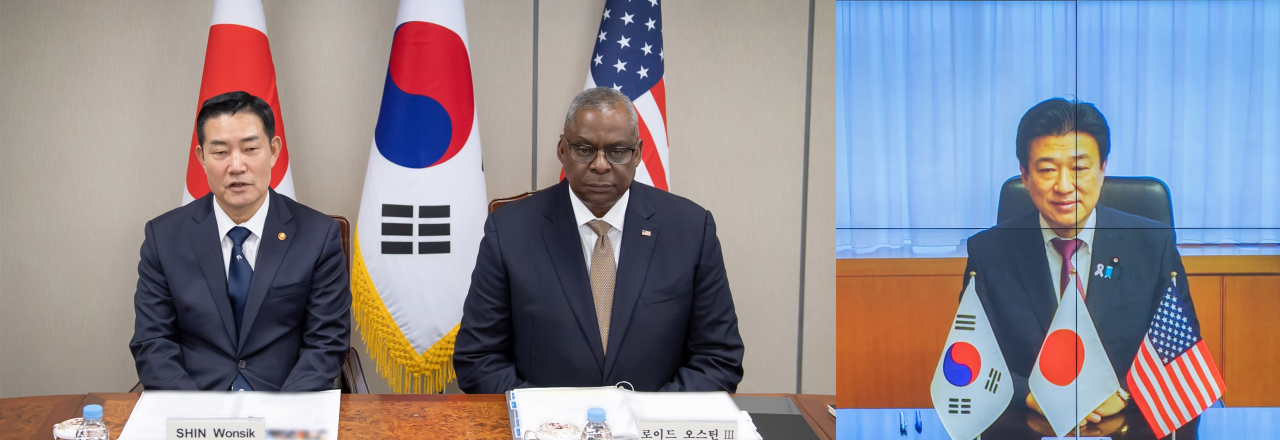S. Korea, US, Japan agree framework for military exercises
Sunday marks first-ever standalone trilateral defense ministerial meeting
By Ji Da-gyumPublished : Nov. 12, 2023 - 18:18

The defense chiefs of South Korea, the United States and Japan on Sunday agreed to stage pre-planned trilateral military exercises from next January with a multi-year framework, marking a significant stride in enhancing trilateral security cooperation in the face of escalating North Korean threats.
The three-way meeting was held for the first time in Seoul since South Korea's new Defense Minister Shin Won-sik and Japan's Defense Minister Minoru Kihara assumed office in October and September, respectively, South Korea's Defense Ministry said Sunday. Kihara participated in the trilateral meeting virtually.
Sunday's meeting of Shin, Kihara and US Defense Secretary Lloyd Austin was the first-ever standalone trilateral defense ministerial meeting, distinguishing itself from previous ones that were held on the sidelines of multilateral events like the Shangri-La Dialogue and the ASEAN Defense Ministers' Meeting Plus, or ADMM-Plus.
The key objective of the meeting was to "discuss ways to strengthen security cooperation between South Korea, the United States, and Japan to deter and respond to the escalating nuclear and missile threats posed by North Korea," the Defense Ministry in a Korean-language statement.
Three defense chiefs particularly convened to discuss and take follow-up measures to the Camp David summit in August, where the leaders of the three countries pledged to elevate their trilateral security cooperation to new heights.
A notable development of the trilateral meeting was the agreement to conduct trilateral exercises based on plans from January of next year -- a key outcome to implementing a leader-level agreement at the Camp David summit.
"The ministers from the three countries assessed that a multi-year trilateral exercise plan is currently being formulated through consultations among South Korea, the United States, and Japan," South Korea's Defense Ministry said.
"They agreed to finalize the development of the plan by the end of the year. Starting from January of the following year, they will conduct trilateral exercises in a more systematic and efficient manner under the exercise plan."
The three "further committed to expanding the scope of trilateral exercises into various domains in the future."
At the Camp David summit, the three leaders "decided on a multi-year trilateral framework that includes annual, named, multi-domain trilateral exercises, which will constitute an unprecedented level of trilateral defense cooperation," the White House said in August.
The planning was accompanied by trilateral efforts to intensify defense-oriented military exercises and reinstate military and non-military drills that had been suspended due to strained relations between Seoul and Tokyo.
For example, the three countries agreed to regularize missile defense exercises and anti-submarine drills to improve responses to North Korea’s missile threats. Additionally, they have resumed maritime interdiction exercises and anti-piracy drills this year.
The three defense chiefs also agreed to run a real-time data-sharing system for North Korean missile launches in December, which is now in the final stages of testing.
The system is designed to improve each country’s ability to monitor North Korean missile launches. The information shared includes data on launch location and trajectory.
The real-time sharing system for missile warning data underwent its inaugural testing in August, preceding the Camp David summit.
The leaders of the three countries first concurred on the information-sharing initiative at a November 2022 summit in Phnom Penh, Cambodia, to "improve each country’s ability to detect and assess the threat posed by incoming missiles, a major step for deterrence, peace and stability."
In the framework of the new information-sharing system, the US Indo-Pacific Command will act as an intermediary between US Forces Korea and US Forces Japan.
The role of the US Indo-Pacific Command includes bridging the existing real-time information-sharing system between the South Korean military and US Forces Korea to the system between US Forces Japan and the Japan Self-Defense Forces.
"The three leaders assessed that trilateral partnership between the United States, Japan, and the ROK is stronger than ever following the Camp David Summit and reviewed implementation progress for trilateral security cooperation initiatives announced at the summit," the US Department Statement said in a separate statement issued, following the defense ministerial meeting.
The ROK stands for the acronym of South Korea's official name, the Republic of Korea.
South Korea's Defense Ministry on Sunday said that the meeting was scheduled in response to the ministry's proposal. The trilateral defense ministerial meeting was planned to coincide with the visit of Austin to Seoul for the Security Consultative Meeting, an annual bilateral defense discussion with South Korea, scheduled for Monday.



















![[Today’s K-pop] Treasure to publish magazine for debut anniversary](http://res.heraldm.com/phpwas/restmb_idxmake.php?idx=642&simg=/content/image/2024/07/26/20240726050551_0.jpg&u=)